
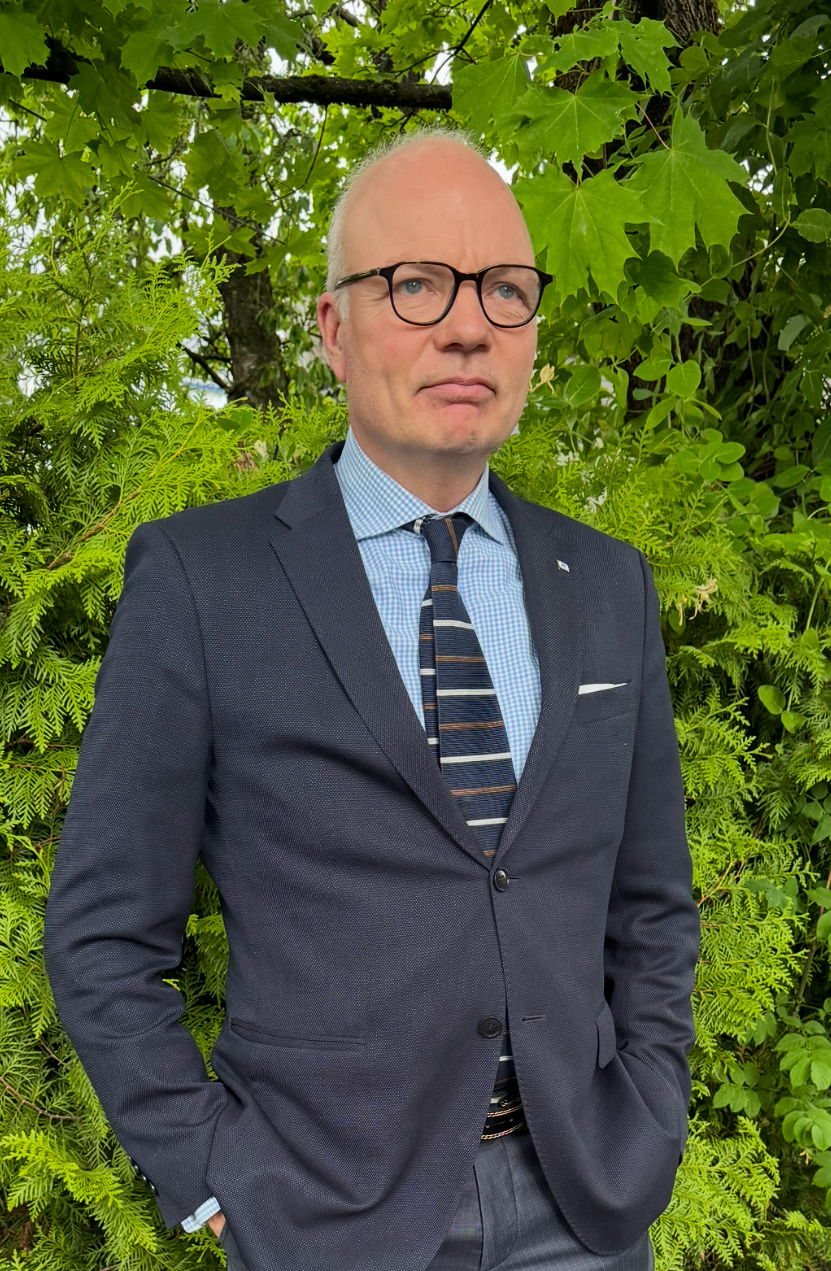
Founder, CEO and Chairman
Sven P. Meyer’s journey as a visionary entrepreneur began with a deeply personal experience. Eleven years ago, when his father fell ill, Meyer visited ten different nursing homes in Oslo in search of a suitable place for his father to spend his final days. What he encountered shocked him. The nursing homes were structured more like institutions than homes, seemingly designed for the elderly to pass away quickly rather than to truly live.
In Norway, securing a spot in a nursing home requires a need for 24-hour care, leaving many elderly individuals without viable alternatives. The two newest nursing homes in Oslo, despite their modern construction, retained the same institutional feel. None provided the warmth and comfort of a true home. Meyer knew that something had to change.
Recognizing a glaring gap in elderly care, Meyer took it upon himself to find a solution. In much of Europe, nursing homes have been replaced by dementia villages and community-based care facilities where residents can rent rooms in welcoming environments with cafés, hairdressers, and essential services. Norway, however, had yet to embrace this concept.
Norway has the highest rate of elderly people living in institutions and serviced housing among Nordic countries. While less than 3% of people aged 65-74 live in institutions or serviced housing, this rate increases significantly for those aged 80 and older. Despite this, the number of elderly individuals living in institutions or serviced housing has been declining in recent years across Nordic countries.
Meyer believes that political leaders have mismanaged oil funds, continuously claiming that they must be saved for future generations while failing to invest in solutions for the elderly today. Frustrated with the system, Meyer decided to act.In 2021, he purchased Tune Prestegård in Sarpsborg, intending to transform it into a paradise for the elderly—a place where they could regain their zest for life rather hanmerely exist.
Thus, “Boglede” was born. More than just a business, it became Meyer’s life project—a sanctuary where people would look forward to living out their later years in an environment of dignity, joy, and care.
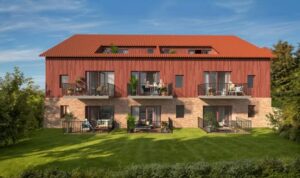
The Road to Mastery
Meyer’s entrepreneurial expertise stems from decades of experience in engineering, construction, and real estate appraisal. Having launched his first construction company in 1986, he has played a pivotal role in shaping Norway’s built environment. His passion for excellence in education led to the co-founding of the Norwegian Academy of Masters in 2018 and the Norwegian Academy of Appraisals in 2022.Despite his rich background, Meyer initially knew little about nursing homes beyond his personal observations. Determined to develop solutions based on research rather than assumption, he pursued a master’s degree, focusing on how to build nursing homes adapted to future needs. Lacking a prior bachelor’s degree, he proposed an unprecedented plan to the Norwegian University of Life Sciences (NMBU)—earning his bachelor’s degree simultaneously with his master’s while maintaining full-time employment.
No one had done this before, but Meyer was permitted to attempt it. His motivation was unparalleled, and two and a half years later, in 2017, his thesis was approved as the best in his class. At 53, he felt like a grandfather among his younger peers, but his determination and vision set him apart.
His research took him across Norway, Iceland, and the United States, where he observed innovative elderly care models. His findings solidified his vision: the nursing home of the future should be small but not too small, fostering a home-like atmosphere rather than an institutional one. Employees must have ample time to engage meaningfully with residents, ensuring that human connection remained central to care.
Norway ranks at the top of the Ageing Society Index, which evaluates countries based on how well they handle the transition to an ageing population. The Norwegian government provides various care services, including home-based assistance and institutional care, with detailed statistics available on staffing, capacity, and financial resources.
Meyer also proposed an unconventional idea to policymakers—offering young Norwegians the choice between working in a nursing home or completing military service. His belief in integrating generations extended to models he witnessed in the United States, where private nursing homes operated like five-star hotels while public institutions struggled.
Among his most compelling findings was the realization that many middle-aged individuals preferred to live further away from their families. A survey revealed that 29% of respondents aged 40-60 wished to reside up to an hour away from their relatives, believing that distance would lead to longer, more meaningful visits rather than rushed encounters squeezed into busy schedules.
A Defining Leadership Moment
Meyer’s leadership philosophy was shaped early in his career. At 22, he started his first company, avoiding the pitfalls he had observed while working under his former boss, who rarely engaged with employees. This uninspiring leadership style stood in stark contrast to Meyer’s belief in active mentorship and motivation.
A pivotal moment solidified his approach. As a young worker in the construction industry, he struggled to secure employment during a difficult market. He eventually offered to work for free for two months to prove his value. After six weeks, the company decided to compensate him, albeit modestly at NOK 10 per hour. However, a tragic accident resulted in him losing two fingers in a sawing mishap. Because his employer had failed to secure insurance, Meyer received no compensation, and the company falsely claimed he had used the saw without permission.
This experience instilled in Meyer a deep commitment to fairness and employee care. He vowed that if he ever became a leader, he would actively engage with his teams, foster ambition, boost self-confidence, and instill a sense of purpose.
Meyer approaches business growth with a balance of patience and adaptability. His philosophy is simple: hire individuals who are better than him at every level, grow slowly where necessary, and expand quickly where feasible—all while maintaining control and staying true to core values.
Listening to new ideas is crucial, but Meyer insists on preserving the fundamental vision of his enterprises. Entrepreneurs often resist change, but he believes in openness to fresh perspectives while ensuring that innovation does not compromise the company’s foundation.
Becoming A Success
Navigating challenges and setbacks is an inevitable part of running any business. There are always obstacles, whether related to market conditions, product viability, employee management, or financial stability. For Boglede Tune Prestegård AS, overcoming adversity has been central to its operations. Recently, Sarpsborg, the town where Tune Prestegård is located, has faced significant economic challenges. A growing population has placed additional strain on resources, but unfortunately, many of the new residents are financially struggling and face high unemployment rates. This shift has contributed to Sarpsborg becoming Norway’s poorest city, leading local politicians to raise taxes and fees, which directly impact businesses like Boglede Tune Prestegård AS. Adapting to these conditions has required strategic measures to ensure stability while maintaining the company’s vision.
One of the key strategies implemented to mitigate financial strain has been cost reduction. Carefully reviewing expenses has allowed the company to optimize resources and minimize inefficiencies without compromising quality. Another necessary change has been restructuring staff roles to make employment more sustainable. Currently, Boglede Tune Prestegård AS employs three permanent workers who oversee all events, while an additional 21 employees are available on an on-call basis. By limiting variable labor costs, the company ensures that staffing aligns with operational needs rather than being an unnecessary financial burden. Additionally, the company has explored alternative revenue streams, such as intimate concerts with packaged pricing. By incorporating food and beverages into the ticket costs, customers perceive greater value, leading to increased attendance. Events designed to create a sense of exclusivity and affordability have been particularly successful in engaging the local community despite financial hardships.
For Meyer, success is measured not only by financial performance but also by employee satisfaction and customer experience. A profitable business is essential for sustainability, but equally important is ensuring a motivated workforce and fostering a positive reputation among customers. He believes that a single dissatisfied customer can undo the goodwill created by ten satisfied customers, making excellent service a top priority. To achieve consistent success, Meyer ensures that every aspect of the business reflects integrity, efficiency, and a strong commitment to quality. This approach has been fundamental in building trust and maintaining long-term relationships with both employees and residents.
Aspiring entrepreneurs seeking to build successful businesses should, according to Meyer, focus on several key principles. The first and most important is an unwavering dedication to quality at all levels. From product development to customer service, excellence must be embedded in every aspect of the business. Equally vital is hiring individuals who are stronger in key areas than the entrepreneur themselves, creating a team capable of driving innovation and efficiency. Scaling must be approached cautiously—expanding too quickly risks compromising quality and financial stability. Meyer also stresses financial discipline, advising against unnecessary spending and high-risk investments that could jeopardize business continuity. By following these principles, entrepreneurs can build lasting ventures that are sustainable and impactful.
Balancing responsibilities across multiple companies requires structured management and strong leadership. As the founder, CEO, and chairman of several businesses, Meyer ensures he remains actively involved through regular meetings with management teams. These sessions allow him to stay informed about operations while providing necessary guidance and strategic oversight. Trust in leadership is another crucial factor—by appointing capable professionals to manage daily functions, Meyer can focus on high-level decision-making without micromanaging. While all businesses inevitably face challenges, he believes that spending time with employees and addressing concerns directly helps maintain a healthy work environment and keeps morale high. Problems must be identified and resolved swiftly to prevent larger disruptions, an approach that has helped Meyer maintain stability across his ventures.
A Case Study in Success
“Norges Mesterakademi”The Norwegian Mester Academy stands as one of Meyer and his partner Henning Møllerløkken’s most remarkable successes. The academy was developed to offer better vocational management education than those approved by the Ministry of Trade and Industry “Mesterbrevnemda” up until now.
Meyer’s academy quickly gained a foothold in the competition with three established schools, including the 160-year-old Folkeuniversitetet. In 2021, they became the 4th school approved to provide “Mesterbrev” education in all vocational subjects.
By 2023, it had captured 60% of the market, with 350 students graduating that year. A key differentiator was accessibility. While competitors also shifted to digital learning post-pandemic, Meyer ensured that his academy provided personalized support through phone consultations every day, at all hours. This hands-on approach proved invaluable, driving student success and trust.
The impact was undeniable. One competing school closed its vocational program, and the Folk University declared bankruptcy in 2024. The Norwegian Mester’s Academy has since expanded into three additional institutions—the Norwegian Academy of Appraisals, the Norwegian Academy of Marketing, and the Norwegian Academy of Health—using the same successful model.
For Meyer, the formula for success remains unchanged. Scaling must never come at the expense of quality, and businesses must always be built on integrity, vision, and genuine impact.
Commitment & Dedication

On the left is the “Drengestuen” from 1855, which has also been a school (1901-1907), in the middle the Main House with foundations from the 16th century, rebuilt after a fire, in 1740, built larger in 1840 and on the right side “Rabekk” from 1820, but moved to Tune Prestegård in 2017.
Boglede Tune Prestegård AS stands out not only for its commitment to elderly care but also for its dedication to historical preservation. The property’s architectural heritage, dating back centuries, has been carefully maintained while incorporating modern infrastructure to meet today’s safety and comfort standards. The main house, originally built in 1500, was destroyed in a fire in 1738 before being rebuilt in 1740 and expanded in 1840 and 1923. Restoration efforts in 1975, 2010 and 2024 have ensured that its historical significance remains intact. Side building one, Rabekk, originally constructed in 1820, was relocated to Tune in 2016 and 2017, while Drengestuen, built in 1855 and used as a school between 1901 and 1907, is currently undergoing restoration to serve as a health center within the elderly care community. Despite their historical nature, all buildings are equipped with modern technologies, including balanced ventilation systems, water-based underfloor heating, and advanced fire alarm systems connected to emergency response stations. Additionally, a barn-style structure featuring eight universally designed apartments adheres to nursing home requirements, ensuring compatibility with contemporary standards. By blending historical preservation with practical modernization, Boglede Tune Prestegård AS has created a sustainable business model that retains cultural integrity while offering state-of-the-art elderly care.
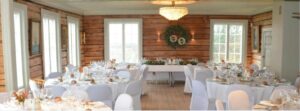
Table set for wedding in the Banquet Hall
One of the company’s biggest ongoing challenges is financial sustainability, given that many local residents have limited disposable income. Encouraging spending while providing a sense of value has required innovative approaches. Offering bundled event pricing, where residents feel they are receiving something extra without additional cost, has proven effective. Creating engaging experiences that maintain affordability ensures continued participation, allowing the company to remain financially viable despite economic fluctuations. Constant refinement of these strategies is key, as Meyer believes that businesses must always seek improvements and adapt to evolving circumstances.
Beyond its primary function as an elderly care center, Boglede Tune Prestegård AS actively contributes to the local community through cultural preservation and historical education. One such initiative involved the acquisition of statues commemorating important historical figures, including Hans Nielsen Hauge. Hauge’s early intellectual development was significantly influenced by his access to the vast library at Tune Prestegård under the guidance of parish priest Gerhard Seeberg. His extensive theological discussions with Seeberg shaped his future as a reformist and advocate for social change, including his push for women’s rights in religious assemblies—a stance that was met with resistance at the time. Boglede Tune Prestegård AS also collaborates with municipal authorities and conservators in restoration projects, ensuring that historical sites remain accessible and properly maintained. Through these efforts, the company fosters a deep connection between its operations and local heritage.

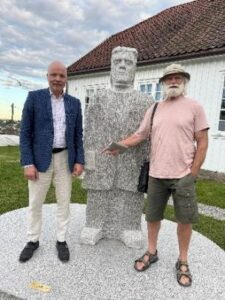

Photo 1: Here, Mayor Magnus Arnesen unveils the statue of Hans Nielsen Hauge. Photo 2: Artist Stig Eikaas and owner of Tune Prestegård Sven Meyer. Photo 3: The statue of Hans Nielsen Hauge on the left and the statue of a woman symbolizing the work Nielsen Hauge did to give women the right to speak. He violated the royal decree of 1741, namely the conventicle poster, which, among other things, imposed an absolute ban on women from speaking.
Towards A Bright Future
In the realm of education, “Norgesakademiene AS” has leveraged its expertise to drive impactful results.
The organization’s success is rooted in its commitment to hiring the best professionals across various disciplines, ensuring excellence at every level. Beginning with the Norwegian Mester Academy, it later expanded into the Appraisal Academy, the Market Academy, and the Health Academy. Each institution was carefully developed to address specific industry gaps, identifying niches where competition was low and demand was high. This strategic positioning has been fundamental to their rapid growth and lasting success.
Innovation plays a crucial role in keeping “Norgesakademiene AS” competitive. One of its most significant advancements has been the implementation of fully digital education programs, enabling students to complete coursework remotely. Additionally, students can access direct support via phone at any time, ensuring guidance is always available. This flexibility has contributed to the academy’s rapid expansion, securing 70% of the market share within just two years. By continuously adapting to evolving educational demands and maintaining high levels of engagement, “Norgesakademiene AS” remains at the forefront of industry innovation.
www.tuneprestegard.no
www.noak.no
www.nma.no
www.ntak.no
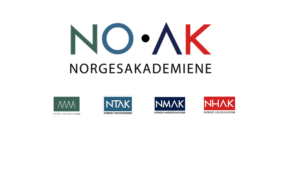
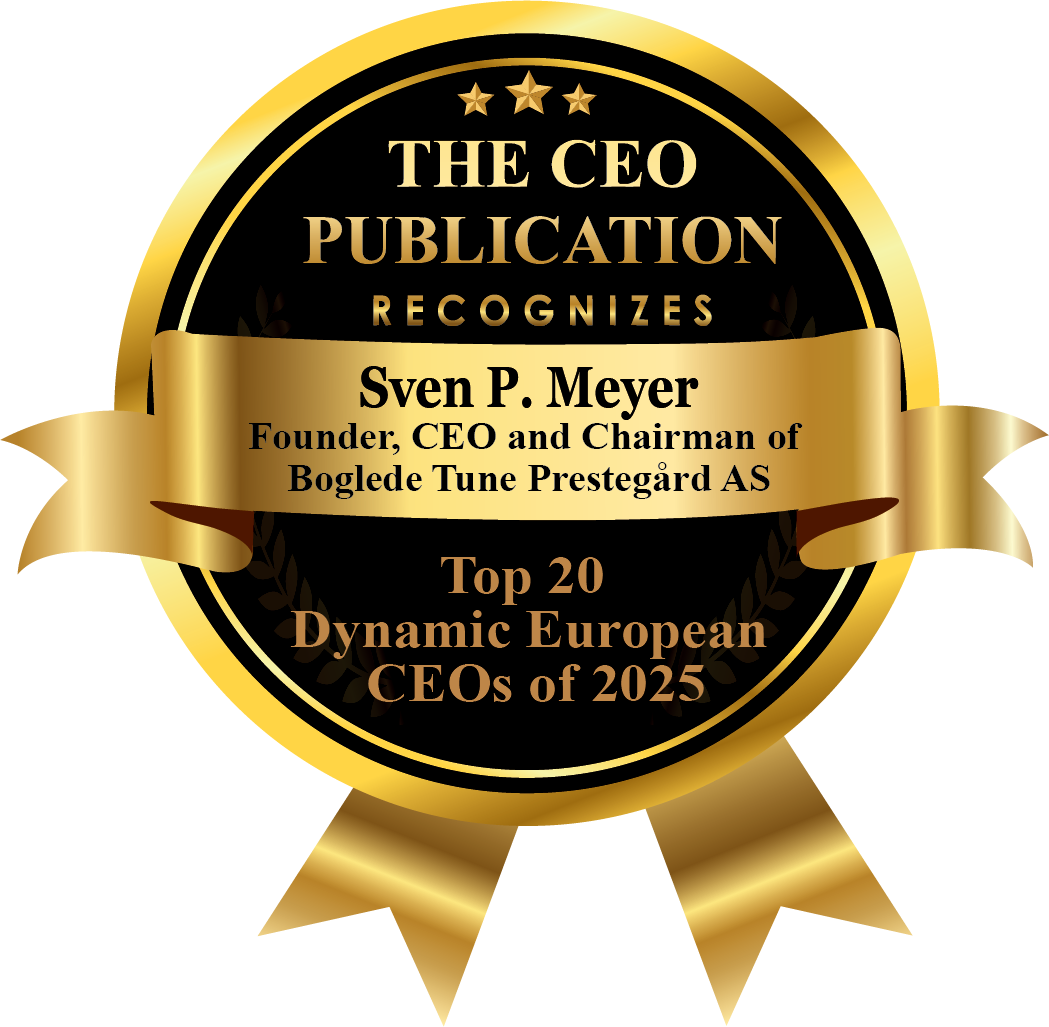
" The formula for success remains unchanged. Scaling must never come at the expense of quality, and businesses must always be built on integrity, vision, and genuine impact. "
Sven P. Meyer
Founder, CEO and Chairman
© THE CEO PUBLICATION 2021 | All rights reserved. Terms and condition | Privacy and Policy